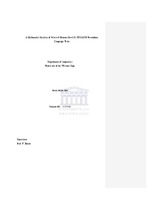A multimodal analysis of selected National Lovelife HIV/AIDS prevention campaign texts
Abstract
This study investigates the ever-changing trends in visual texts and images used during HIV-prevention campaigns in South Africa. The aim is to evaluate and analyse the effect of multimodal texts used in HIV/AIDS campaigns on the understanding and interpretation by the target group, and thus gauge their effectiveness. Using a text-based multimodal approach (Kress and van Leeuwen, 1996/2006; Martin and Rose, 2004), the study takes into account variables such as socio-economic status, literacy levels, language and cultural differences of readers to evaluate the efficacy of loveLife campaigns to disseminate the HIV/AIDS prevention message. This study focuses on the choice of images and words, and whether they cohere to make a meaningful message. The study analyses how the design features, including images, colour and words, impact on the interpretation of the message and also how the design acts as an aid or barrier to the process of decoding the message. The choice of a two-pronged approach combining multimodality and a text-based (discourse) analyses often favoured by those working in systemic functional linguistics is that it enables the researcher to account for social context, economic, linguistic, cultural and behavioural factors that play a role during the decoding phase.

